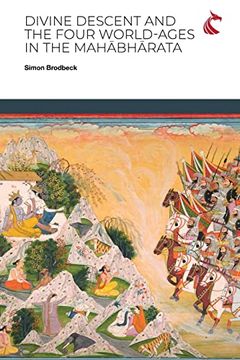Divine Descent and the Four World-Ages in the Mahā Bhā Rata - or, why Does the Kṛ ṣ A Avatā Ra Inaugurate the Worst Yuga? (en Inglés)
Reseña del libro "Divine Descent and the Four World-Ages in the Mahā Bhā Rata - or, why Does the Kṛ ṣ A Avatā Ra Inaugurate the Worst Yuga? (en Inglés)"
This monograph approaches the Mahābhārata as a single work of literature, and the method is that of close textual study. Key verses are quoted in the original Sanskrit and in English translation. The title problem has been recognised before, but no detailed solution has been forthcoming. The monograph's objective is to try to articulate a Mahābhārata theology of time.In Chapter 1, the monograph's argument and synchronic methodology are summarised. In Chapter 2, the cycle of four yugas (world-ages) is outlined and discussed on the basis of the textual evidence. Each yuga is shorter and less moral than the last, and between them they constitute a repeating 12,000-year cycle. In Chapter 3, the Mahābhārata war is shown to be located at the junction between the third and fourth yugas. The idea of God Viṣṇu-Nārāyaṇa descending to improve the world is introduced, and the title question is properly posed: Why does God's descent as Kṛṣṇa (to make the Mahābhārata war happen) inaugurate the worst yuga? In Chapter 4, the various descents (avatāras, 'crossings-down') of God Viṣṇu-Nārāyaṇa are discussed. Also discussed is a theory suggesting that the passage between yugas always requires a divine descent to effect it. The limitations of this theory are described and an alternative sketched.In Chapter 5, two general functions of divine descent are identified: to improve the world morally by killing demons, and to help the personified Earth by reducing the human weight upon her. These two functions are correlated with the two extremities of the four-yuga cycle, between which time oscillates. But the Mahābhārata war is not located at either extremity. Central to the monograph is a survey and discussion of the reasons given for this particular descent. These passages combine the two functions of divine descent, neither of which is entirely appropriate to this moment. It is argued that the descent here represents what happens over the course of the whole cycle. The discussion draws on Vedic literature, touches on gender issues, and shows how the two functions play out in the story of the war.In Chapter 6, the progress of the fourth yuga is tracked through the Mahābhārata's various characters and then the ancient audience, who would anticipate the start of the next cycle. It is hypothesised that this was to occur through the long-term action of the Mahābhārata, as more and more people would put into practice the teachings presented by Kṛṣṇa in the Bhagavadgītā. The Kṛṣṇa avatāra would thus inaugurate the worst yuga because the seed planted there takes time to ripen. Chapter 7 reflects summarily upon the monograph's explorations, the theory of divine descent, and the text's theology of time. By employing a resolutely synchronic methodology the monograph makes a significant contribution on an important and latterly overlooked issue.

